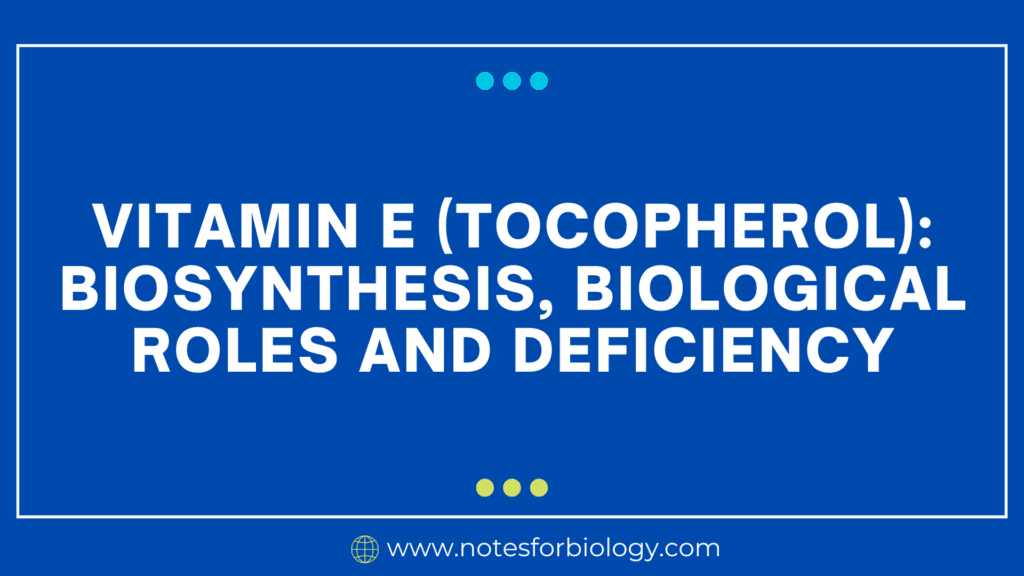Vitamin E, a fat-soluble warrior against free radicals, plays a crucial role in maintaining good health. But where does it come from? How does it benefit us? And what happens when we lack it? Let’s delve into the fascinating world of vitamin E, exploring its biosynthesis, biological roles, and the consequences of deficiency.
Table of Contents
Vitamin E (Tocopherol)

Vitamin E is a group of fat-soluble compounds known primarily for their antioxidant properties. The most common form of it in the human body is alpha-tocopherol. It plays a crucial role in protecting cells from oxidative damage, supporting immune function, and maintaining skin and eye health.
Biosynthesis: A Plant’s Gift
Unlike most vitamins synthesized by our bodies, humans obtain it primarily from our diet. Plants, however, are the masterminds behind its creation. Here’s the biosynthesis journey:

- The Starting Point: The journey begins with a molecule called homogentisate, formed from the amino acid phenylalanine.
- Tailoring the Structure: Enzymes modify homogentisate, adding a prenyl group (a five-carbon unit) to form a molecule called phytylpyrophosphate.
- Branching Out: Depending on the number and position of methyl groups attached to the phytyl tail, different tocopherols are formed. Alpha-tocopherol, with three methyl groups at specific positions, is the most potent form absorbed and utilized by humans.
Biological Roles: A Guardian Angel

Vitamin E wears many hats, each contributing to our well-being:
- Antioxidant Powerhouse: Its primary function is as a lipid-soluble antioxidant. It combats free radicals, unstable molecules that damage cells and contribute to aging and chronic diseases. By neutralizing these radicals, vitamin E protects cell membranes and safeguards vital cellular components.
- Immune System Booster: Vitamin E strengthens the immune system by supporting the production of immune cells and enhancing their response to invaders.
- Inflammatory Fighter: It possesses anti-inflammatory properties, potentially reducing the risk of chronic inflammatory diseases.
- Visionary Role: Vitamin E may help maintain healthy vision by protecting against age-related macular degeneration.
- Reproductive Health: Adequate vitamin levels might be beneficial for reproductive health in both men and women.
Deficiency: A Cause for Concern
While rare in developed countries, vitamin E deficiency can occur. Here’s what you might experience:
- Increased Oxidative Stress: With a lack of vitamin E’s antioxidant power, free radicals can damage cells more readily, potentially leading to various health issues.
- Nerve Damage: Deficiency can manifest as peripheral neuropathy, characterized by numbness, tingling, and weakness in the hands and feet.
- Muscle Weakness: Vitamin E deficiency might contribute to muscle weakness and fatigue.
- Vision Problems: In severe cases, a lack of vitamin E can contribute to vision problems.
Maintaining Optimal Levels
Ensuring adequate vitamin E intake is crucial. Here are some excellent dietary sources:
- Seeds and Nuts: Sunflower seeds, almonds, and peanuts are rich sources.
- Vegetable Oils: Wheat germ oil, sunflower oil, and safflower oil are good options.
- Fatty Fish: Salmon, tuna, and mackerel are packed with it.
- Green Leafy Vegetables: Spinach and kale contribute to daily intake.
Frequently Asked Question
What is Vitamin B complex ?
Vitamin B complex is a collection of eight water-soluble vitamins that perform critical roles in cellular metabolism and overall physiological function. Vitamin B complex, Each of these vitamins has distinct structures and functions, but they frequently collaborate to sustain a variety of biological functions, such as energy production, red blood cell creation, and the health of the skin, eyes, and nervous system.
How to maintaining Optimal Levels Vitamin B complex ?
Seeds and Nuts: Sunflower seeds, almonds, and peanuts are rich sources.
Vegetable Oils: Wheat germ oil, sunflower oil, and safflower oil are good options.
Fatty Fish: Salmon, tuna, and mackerel are packed with vitamin E.
Green Leafy Vegetables: Spinach and kale contribute to daily intake
Related Article
Vitamin B complex: Structure, coenzyme forms and Biological roles

